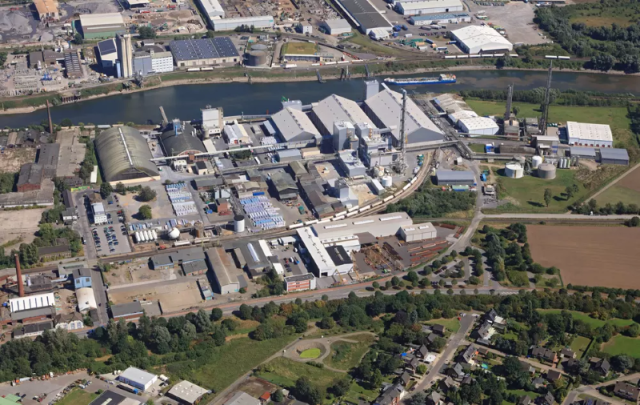Decarbonising fertilizer production in Germany, India
By Julian AtchisonOscar Pearce on April 22, 2024
OCI to supply low-carbon ammonia to Germany

Click to learn more. OCI Global will ship low-carbon ammonia from Texas to COMPO EXPERT’s fertiliser production plant in Krefeld, Germany. Source: COMPO EXPERT.
OCI Global will deliver ammonia produced at its Texas plant to COMPO EXPERT in Germany. This year, COMPO EXPERT will replace 25% of the ammonia it currently uses with OCI’s product, increasing over the next two years. Ammonia from the Beaumont plant will have a 60% lower carbon footprint than industry standard, which OCI indicates has been verified by third-party auditor SCS Global. From Beaumont, the ammonia will be transported to OCI’s terminal and distribution hub at the Port Of Rotterdam, and then onto Germany.
Decarbonisation of the Beaumont facility is proceeding in stages, with both renewable and CCS-based hydrogen being deployed in an “over-the-fence feedstock” approach. Linde will construct and operate the CCS hydrogen facility to produce feedstock for OCI, and is ultimately aiming for 95% emissions capture, based on autothermal reforming technology. Production capacity for an additional 1.1 million tons of ammonia is currently being built in Beaumont.
In a holistic approach, we do not only consider our own production, but also our raw materials as well as the transportation and application of our products. As ammonia is our most important raw material, and has the largest contribution to our carbon footprint, replacing 25% of our demand in 2024 with a lower carbon variety is an important step with a major contribution to our goal.
Ingo Müller, CEO of COMPO EXPERT in OCI’s official press release, 8 Apr 2024
IFFCO to offtake renewable ammonia from ACME
In a similar supply chain move, the Indian Farmers Fertiliser Cooperative Limited (IFFCO) will offtake 200,000 tons of renewable ammonia per year from ACME’s under-development plant in Gopalpur, Odisha. The delivered ammonia will feed fertiliser production at IFFCO’s facilities in Odisha and Gujarat. Under the terms of the deal, IFFCO will transfer “Internationally Transferred Mitigation Outcomes” (or ITMOs) to ACME, which can be used as offsets in various international settings. For an exploration of how ITMOs work, see our explainer below.
This collaboration with IFFCO marks a significant stride in our mission to advocate for sustainable energy solutions. The MoU lays the groundwork for bilateral agreements between India and other nations under the Paris Agreement.
Hiren Mehta, CCO at ACME, as quoted in “IFFCO aligns with Green Hydrogen Mission; signs MoU with ACME”, Indian Cooperative (6 Apr 2024)
So…what are ITMOs?
AEA Certification Specialist Oscar Pearce explains:

Click to expand. The use of ITMOs by two parties to offset emissions, based on excess emissions reductions achieved by the transferring party. Source: Carbon Markets Express.
Internationally Transferred Mitigation Outcomes (ITMOs) are, essentially, carbon credits or offsets established under the Paris Agreement to give countries greater flexibility in meeting their Nationally Determined Contributions (NDCs). Article 6 of the Paris Agreement introduces the concept of ITMOs with the stated purpose of facilitating collaborative emission reductions. In practical terms, it allows countries to convert superfluous emissions reductions into credits that may be transferred or traded to those struggling to meet their targets, on the condition that those emissions reductions are not counted towards meeting the NDC of the originating country. ITMOs also extend to “entities”, such as project developers.
The flip side of this flexibility is a concern that ITMOs may enable double counting or the mere reallocation of emissions without an overall reduction. To mitigate these issues, the rules agreed relating to Article 6 at COP26 in Glasgow include two further provisions: the Overall Mitigation of Global Emissions mechanism, which retires 2% of all transferred ITMOs to ensure a minimum reduction in GHG emissions, and the Share of the Proceeds Levy, which allocates 5% of all transferred ITMOs to the Adaptation Fund which supports climate actions in developing countries.
A recent example was the purchase of ITMOs by the KliK Foundation – a Swiss entity intending to use the credits under Switzerland’s Emissions Trading Scheme – from Energy Absolute Public Co. Ltd. which operates Bangkok’s E-Bus Program. The agreement involved Switzerland using the E-Bus reductions to decrease the emissions accounted for under its NDC, while Thailand added the equivalent quantity to its own national accounts.
The relevance of ITMOs for industry lies in the fact that the Article 6 regime has opened a new avenue to realising green premiums. While precise constraints on ITMOs will vary from jurisdiction to jurisdiction, producers of sustainable alternative fuels in countries that outperform their NDCs, for example, could receive a green premium for their products in exchange for allowing their government to trade their emissions reduction as an ITMO.